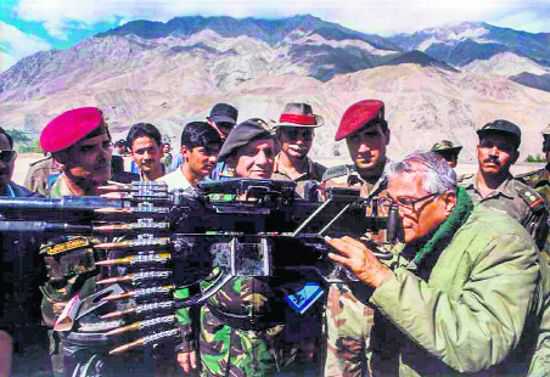
Fighter: Former Defence Minister George Fernandes was a fiery orator and a dedicated votary of human rights.
Shambhu Shrivastava
Former general secretary, Samata Party
THE best tribute to George Fernandes would be to acknowledge the fact that nobody, just nobody ever treated him as a Christian. He was always regarded as a front-ranking leader of post-Independence India. He was a true embodiment of the idea of India. This fact assumes great meaning in these times where a person’s religious and caste identity has become a badge of honour.
George was a lifelong rebel. His family sent him to a Christian seminary for training as a priest, but he rebelled and was expelled from the institution. In no time, he became a socialist and moved to Bombay. Not many people know that in his early years in Bombay, he slept on the pavement. But he persisted and became a great trade union and socialist leader and a Member of Parliament from, of all places, South Mumbai.
I worked closely with George for about 10 years as general secretary and spokesperson of the Samata Party. I had the good fortune to learn a lot from him, both as a person and as a political leader. “Politics is about people,” he often said. I travelled with him to the remotest parts of India. It was obvious during the travels that he was the most connected person in every part of the country. He did not bother about luxuries. Once during a tour of Mizoram, we survived for several days on rice, boiled beans and bananas. When we stayed in guest houses or at some party worker’s place, people from all parties and all walks of life came to meet him.
He exhorted the youth to shun complacency and confront the establishment that was denying them their due. “Gussa karo,” was his mantra. If you are not angry with the system, you won’t be able to change it, he argued.
A true Gandhian, George lived a very simple life. He used to wash his own clothes till his early seventies, before ill-health enfeebled him. In any case, he had a meagre wardrobe. He held on to his Fiat car for well over two decades, even when he served as the Defence Minister. His house was an open place where anybody could walk in or out. He spoke many languages fluently and this helped him connect with people across India.
A bitter opponent of the Emergency, he was arrested in the Baroda dynamite case in 1976 and lodged in Delhi’s Tihar jail. In 1977, he was handpicked by Jayaprakash Narayan to contest from Muzaffarpur (Bihar), which had sent socialists such as Ashok Mehta to Parliament. George fought the electoral battle from behind bars and won by a huge margin.
George was not only a fiery orator, but also a dedicated votary of human rights and democracy across the globe. His support to the cause of Tibetan independence worried China, especially during his tenure as the Defence Minister. When the US declared war on Iraq in 2003, India came under intense pressure to join the conflict. The Cabinet Committee on Security was divided on whether India should send troops to Iraq. George told me that he could not openly condemn the war as he was part of the government, but he gave me a free hand to articulate his concerns.
Today, when George is no more, we must recall a particular quality which I saw from very close quarters, that of a coalition builder. If the Vajpayee government lasted smoothly for six years as a successful coalition, it was largely due to his tireless efforts and Atalji’s flexibility and generosity.
The first crisis hit the Vajpayee government in August 1998, reaching a point where AIADMK looked set to withdraw support to the government before August 15. I recall George travelling to Chennai to meet Jayalalithaa and returning on the night of August 14, having warded off the crisis. Hence, Atalji hoisted the national flag atop the Red Fort as a full-fledged Prime Minister and not as a caretaker one.
George had a great personal equation with many leaders, including M Karunanidhi, Parkash Singh Badal, NT Rama Rao, Mulayam Singh Yadav and hold your breath, several Congress leaders. Left leaders will be surprised to know that he was a regular reader of New Age and People’s Democracy.
He was against the politics of untouchability. He freely interacted with RSS leaders, but also asked me once to draft a strong statement advising the RSS to confine itself to cultural and social activities. He believed in dialogue and full freedom of expression. He took up many causes which were otherwise considered lost.
Memories are flooding me. It is impossible to write more today. Goodbye, George. Heaven is no more safe from rebellion!



























